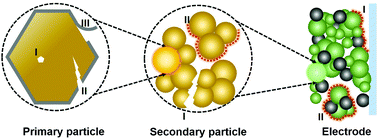Stress-resilient electrode materials for lithium-ion batteries: strategies and mechanisms
Abstract
Next-generation high-performance lithium-ion batteries (LIBs) with high energy and power density, long cycle life and uncompromising safety standards require new electrode materials beyond conventional intercalation compounds. However, these materials face a tradeoff between the high capacity and stable cycling because more Li stored in the materials also brings instability to the electrode. Stress-resilient electrode materials are the solution to balance this issue, where the decoupling of strong chemomechanical effects on battery cycling is a prerequisite. This review covers the (de)lithiation behaviors of the alloy and conversion-type anodes and their stress mitigation strategies. We highlight the reaction and degradation mechanisms down to the atomic scale revealed by in situ methods. We also discuss the implications of these mechanistic studies and comment on the effectiveness of the electrode structural and chemical designs that could potentially enable the commercialization of the next generation LIBs based on high-capacity anodes.



 Please wait while we load your content...
Please wait while we load your content...